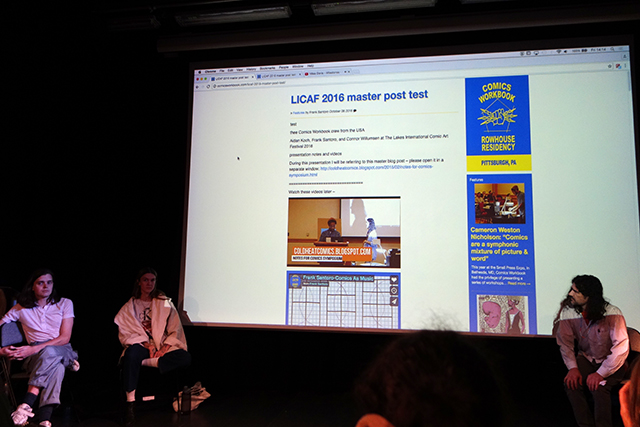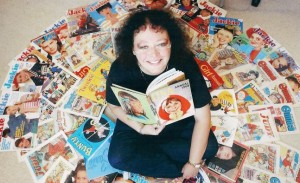
Frank Santoro, Aidan Koch and Connor Willumsen at the 2016 Lakes International Comic Art Festival, talking about the evolution of the Comic Workbook as both a platform and guidance for budding comics artists. Photo courtesy Comic Workbook
Mel Gibson reports on another aspect of this year’s Lakes International Comic Art Festival – its academic workshop, an aspect set to expand next year…
The Lakes International Comic Art Festival‘s approach to developing links with the academy is distinctive. Their work with Lancaster University, for instance, which has led to Benoît Peeters becoming the UK’s first professor of graphic fiction and comic art sets the tone.
The way academics and their work is integrated into the fabric of the Festival is more integrated than is often the case. This is shown in Benoît’s participation in the very lively opening debate of the festival, Asterix Versus Tintin, and by the use of academics like myself as presenters, workshop leaders, speakers and hosts throughout.
There’s also an element of the festival which offers academics a space to network and simply catch up with others in what is a multidisciplinary and international field. This took place this year, hosted by Aileen McEvoy, on the afternoon of Friday 16th October, leading up to the Festival opening.
The afternoon began with a sandwich lunch (always a good plan) where everyone introduced themselves and their research. The twenty or so participants also included creators interested in understanding academic approaches to comics. Simply being able to make new links, or actually meet up with people one has only ever spoken with over email is great.
However, the body of the event actually had a rather different focus in comprising of two workshop sessions. In the first, Frank Santoro’s Comics Workbook, there was a presentation by Frank, Aidan Koch and Connor Willumsen on the evolution of the Comics Workbook as both a platform and guidance for budding comics artists. You can read Connor’s summary of the event and of LICAF, here. (I really enjoyed this summary, which recounts a rather different version of the event from the one I experienced and suggests what a lovely tapestry of opportunities LICAF offers).
The academics were not alone, as local students also participated in the session, which was followed up with creative workshops for the students.
This was very practical in that we all started from a question, in this case about Brexit (so, pretty emotional stuff), and then Stuart worked on developing our words and ideas into diagrams and cartoons about this as an issue, including our emotional factors, structural ones and what possible solutions might arise. I think, although I suspect everyone had their own take on the discussion that emerged, was that the aim was to gather our perspectives, as end users, as it were and then come up with summaries which could inform policy, the actions of various professionals and others.
After all this intellectual and emotional stimulus, many felt the need for a drink, which was available at the opening reception for the festival at the Brewery Arts Centre, where Benoît talked about his role. This was also really enjoyable and offered both a thinking and decompressing space before everyone moved on to the Asterix versus Tintin debate and its very varied academic and other arguments. (My favourite contribution remains the one offered by Graham Dury about who drew the best horses…).
Thanks to all involved for making LICAF such a wonderful event!
Mel Gibson
• The Lakes International Comic Art Festival returns to Kendal on 13th – 15th October 2017. Announced guests so far include Sergio Aragones. Web: www.comicartfestival.com
• Comics Workbook is a training school and residency program based in Pittsburgh, PA. It is an online correspondence course, and an international network of cartoonists. It is a world-wide composition competition, monthly comic salons, backyard masterclasses, and a library of minicomics. It is a community, a team, a house on the corner. For more information visit: comicsworkbook.com
• Read Connor Willumsen’s report on the Festival here
• If you’re interested in the nitty gritty of Frank Santoro’s presentation at the Festival, his advance notes are here, which complement his notes originally presented at the New York Comics & Picture-story Symposium here
Mel Gibson is a UK based comics scholar and consultant. She has run trainingand promotional events about comics, manga and graphic novels for libraries, schools and other organisations since 1993 when she contributed to Graphic Account on developing graphic novels collections for 16-25 year olds, published by the Youth Libraries Group. Mel runs also training events on working with young adults in libraries and working with picture books.
Mel is a researcher and lecturer, as well as a trainer. She is a Senior Lecturer at Northumbria University specialising in teaching and research relating to children and young people and has a huge interest in visual literacies. She is a National Teaching Fellow and writes about Teaching and Learning in Higher Education in the UK. This writing has also encompassed advising on successfully completing a Humanities PhD in Britain. Tome Reader, located on Mel’s website http://www.dr-mel-comics.co.uk/ offers support, guidance and humour about this particular academic challenge.
Mel’s doctoral thesis was on British women’s memories of their girlhood comics reading, which ties in to her training work, and her MA thesis also focused on comics. She has published a number of articles and chaptersrelated to this research and about other aspects of comics, graphic novels and manga. She has presented papers at many conferences and has been involved in organising strands on comics, pedagogy and visual literacies.
Mel has also worked extensively with television and radio, promoting and enthusing about comics, graphic novels and manga, including the BBC4 series Comics Britannia.
The founder of downthetubes, which he established in 1998. John works as a comics and magazine editor, writer, and on promotional work for the Lakes International Comic Art Festival. He is currently editor of Star Trek Explorer, published by Titan – his third tour of duty on the title originally titled Star Trek Magazine.
Working in British comics publishing since the 1980s, his credits include editor of titles such as Doctor Who Magazine, Babylon 5 Magazine, and more. He also edited the comics anthology STRIP Magazine and edited several audio comics for ROK Comics. He has also edited several comic collections, including volumes of “Charley’s War” and “Dan Dare”.
He’s the writer of “Pilgrim: Secrets and Lies” for B7 Comics; “Crucible”, a creator-owned project with 2000AD artist Smuzz; and “Death Duty” and “Skow Dogs” with Dave Hailwood.
Categories: Comics Education News, Comics Studies, Creating Comics, downthetubes Comics News, downthetubes News

 Call for Papers: Comics Forum 2024
Call for Papers: Comics Forum 2024  Dundee University scraps Comics Masters design course, claiming numbers had dwindled
Dundee University scraps Comics Masters design course, claiming numbers had dwindled  Who Cares for Comics? Online event with Kay Sohini and Jared Gardner will discuss “Graphic Medicine and Comic Art”
Who Cares for Comics? Online event with Kay Sohini and Jared Gardner will discuss “Graphic Medicine and Comic Art”  Comics Up Close returns next month, at Sheffield Hallam University
Comics Up Close returns next month, at Sheffield Hallam University